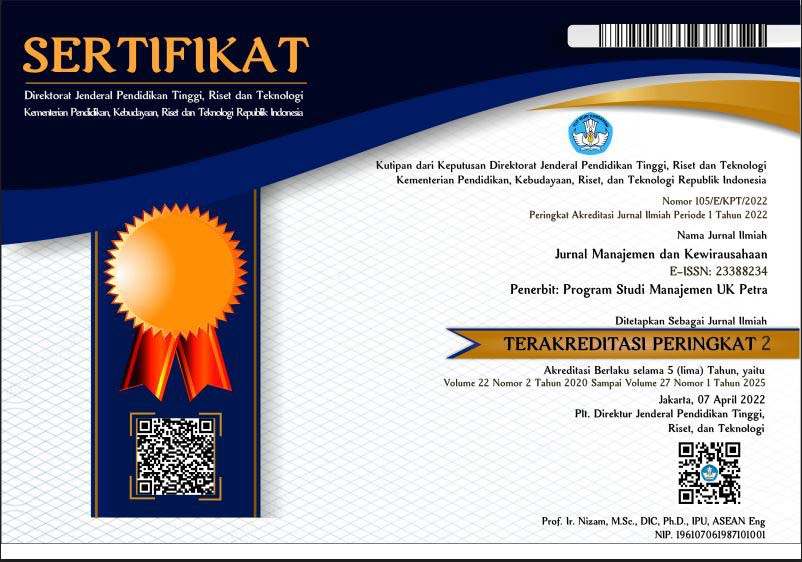FAKTOR-FAKTOR YANG BERPENGARUH TERHADAP JUMLAH UANG BEREDAR DI INDONESIA SEBELUM DAN SESUDAH KRISIS: SEBUAH ANALISIS EKONOMETRIKA
 :
:
https://doi.org/10.9744/jmk.4.1.pp.%2046-55
Keywords:
monetary policy, government spending, foreign reserves, money multiplier, log model.Abstract
This study uses regression analysis with a log model to analyze the effect of government spending, foreign reserves and the money multiplier on the money supply in Indonesia for the period before the economic crisis (1990-1997), since the crisis (1997-1999) and overall (1990-1999). Before the crisis, the results show that government spending is significantly and positively related to the money supply; foreign reserves are not significant, and the money multiplier is actually significantly and negatively related to the money supply. Since the crisis, government spending is still positively and significantly related with money supply while the foreign reserves and money multiplier are not significant. For the entire time period, government spending and foreign reserves have a positive and significant effect on money supply while the money multiplier has no significant effect. The government should apply fiscal policy as is has since the crisis and increase the amount of foreign reserves which it holds. The government should not depend on using the money multiplier in monetary policy since it was found to have no significant effect on money supply. Abstract in Bahasa Indonesia : Penelitian ini menggunakan analisa regresi dengan model log untuk menganalisa pengaruh pengeluaran pemerintah, cadangan devisa, serta angka pengganda uang (money multiplier) terhadap jumlah uang beredar di Indonesia untuk periode periode sebelum krisis (1990-1997), sesudah krisis (1997-1999) dan secara keseluruhan (1990-1999). Sebelum krisis hasil menunjukkan bahwa pengeluaran pemerintah secara signifikan berpengaruh positif terhadap jumlah uang beredar (M2); cadangan devisa tidak signifikan terhadap jumlah uang beredar; sedangkan angka pengganda uang berpengaruh negatif dan signifikan terhadap jumlah uang beredar. Sesudah krisis, pengeluaran pemerintah secara signifikan berpengaruh positif terhadap jumlah uang beredar sedangkan cadangan devisa dan money multiplier tidak signifikan. Untuk seluruh waktu analisa, pengeluaran pemerintah dan cadangan devisa berpengaruh secara signifikan dan positif terhadap jumlah uang beredar sedangkan angka pengganda uang tidak signifikan. Pemerintah diharapkan menerapkan kebijakan fiskal sesuai yang telah diterapkan selama krisis berlangsung serta meningkatkan jumlah cadangan devisa yang dimilikinya. Pemerintah sebaiknya tidak mengandalkan money multiplier dalam kebijakan uang yang beredar karena tidak berpengaruh signifikan terhadap uang yang beredar. Kata kunci: kebijakan moneter, pengeluran pemerintah, cadangan devisa, angka pengganda uang, model log.Downloads
Published
2004-06-04
How to Cite
Prayitno, L., Sandjaya, H., & Llewelyn, R. (2004). FAKTOR-FAKTOR YANG BERPENGARUH TERHADAP JUMLAH UANG BEREDAR DI INDONESIA SEBELUM DAN SESUDAH KRISIS: SEBUAH ANALISIS EKONOMETRIKA. Jurnal Manajemen Dan Kewirausahaan, 4(1), pp. 46-55. https://doi.org/10.9744/jmk.4.1.pp. 46-55
Issue
Section
Articles
License
Authors who publish on this journal agree to the following terms:
- Authors retain copyright and grant the journal right of first publication with the work simultaneously licensed under a Creative Commons Attribution License that allows others to share the work with an acknowledgement of the work's authorship and initial publication in this journal.
- Authors are able to enter into separate, additional contractual arrangements for the non-exclusive distribution of the journal's published version of the work (e.g., post it to an institutional repository or publish it in a book), with an acknowledgement of its initial publication in this journal.
- Authors are permitted and encouraged to post their work online (e.g., in institutional repositories or on their website) prior to and during the submission process, as it can lead to productive exchanges, as well as earlier and greater citation of published work (See The Effect of Open Access).

















